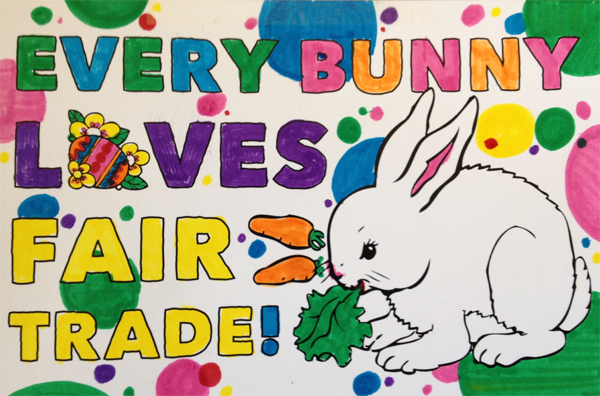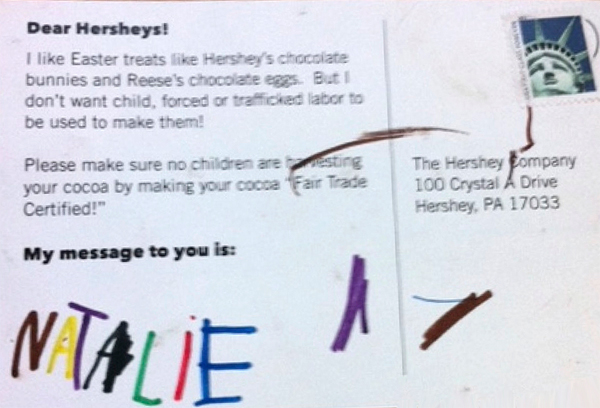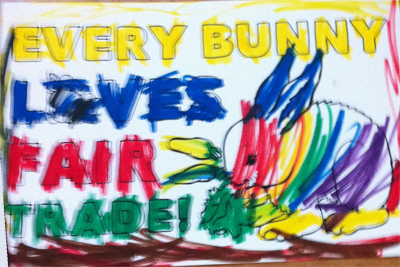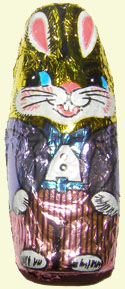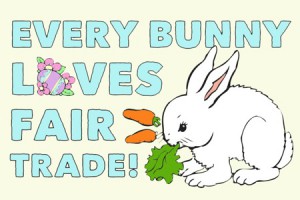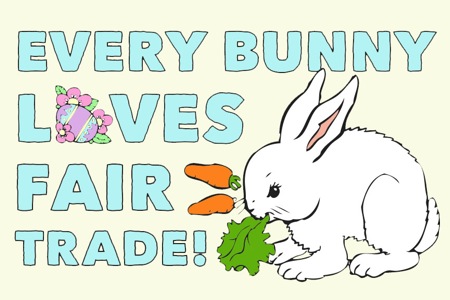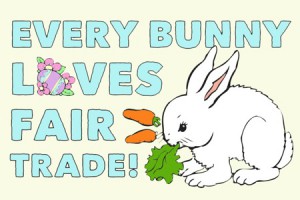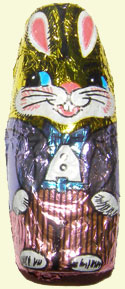
Kids everywhere love Divine Chocolate!
At Global Exchange we love to celebrate Fair Trade all the time, but this Easter, things will get even sweeter with free chocolate!
Come by anytime Saturday April 7 through Sunday April 8 and you’ll get a free piece of Fair Trade chocolate with any purchase of $20 or more at our Global Exchange Fair Trade stores. From handmade baskets to colorful spring gifts, Global Exchange is excited to help make your Spring have a positive global impact.
For some, Easter means nibbling cute chocolate bunny rabbits, but for many others, especially in West African cocoa-exporting countries, chocolate is a terrible reminder of the harsh reality of child slave labor.
Global Exchange remains committed to supporting Fair Trade cocoa producers around the globe and generating a better world for all of us, kids and adults alike. You too can show your support this Easter by purchasing chocolate from two amazing Fair Trade chocolate vendors: Divine Chocolate and Equal Exchange.
What makes Divine Chocolate so divine and Equal Exchange equally as inspiring? The cooperatives that produce the cocoa, of course!
How Fair Trade has impacted the Kuapa Kokoo cooperative in Ghana and CONACADO in the Dominican Republic:

Fatima Ali, proud member of Kuapa Kokoo. Photo courtesy of Kuaka Kokoo.
Just listen to the shouts of “papa paa!” from the farmers of Kuapa Kokoo in Ghana, a cocoa cooperative started in 1993 which now owns 45% of the Divine Chocolate company itself. “Papa paa” means “best of the best” in the Twi language of Ghana, and is a motto which extends beyond the high quality of the cocoa grown by the farmers and into the cooperative’s commitment to Fair Trade and the betterment of members’ lives.
The social premium that members receive through the cooperative’s Fair Trade certification translates into real benefits for the community at large, such as clean water wells. Kuapa Kokoo also has a strong focus on gender empowerment, which means that women like Fatima Ali, a local Kuapa Kokoo Society recorder and proud owner of a 5-acre farm, can aspire to leadership positions they previously thought impossible.
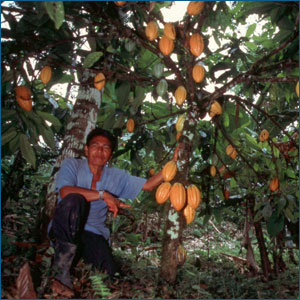
CONACADO producer & the bright orange cacao pods that become chocolate bars. Photo courtesy of Equal Exchange.
For over 25 years the worker owned co-op Equal Exchange has been advocating “Small Farmers, Big Change”– and it’s working. In the Dominican Republic, Equal Exchange’s farmer partner cooperative CONACADO has been able to sell over 40% of their cacao on the Fair Trade market. By participating in Fair Trade, CONACADO has been able to provide school supplies and scholarships for members’ children as well as launch the “Cacao Route,” an eco-tourism project that also generates local income.
One woman who came by the San Francisco store said the other day, “It’s so great that kids these days can eat really good chocolate!” It sure is! And not only that, when you buy Fair Trade chocolate it means that cocoa-producing farmers benefit.
TAKE ACTION!
 Check out this awesome recipe for Chocolate Satsumas, perfect for enjoying the marvelous citrus fruits that are in season at your local farmers’ markets. Or make a delicious Earl Grey Chocolate Tea Cake for your Easter Sunday brunch–(our stores sell Fair Trade tea too!) Have a great Fair Trade chocolate recipe? Share it in the comments!
Check out this awesome recipe for Chocolate Satsumas, perfect for enjoying the marvelous citrus fruits that are in season at your local farmers’ markets. Or make a delicious Earl Grey Chocolate Tea Cake for your Easter Sunday brunch–(our stores sell Fair Trade tea too!) Have a great Fair Trade chocolate recipe? Share it in the comments!- Don’t forget to get your free Fair Trade chocolate. Come by the San Francisco, Berkeley, Arlington, VA or D.C. stores on Saturday April 7 & Sunday April 8.

